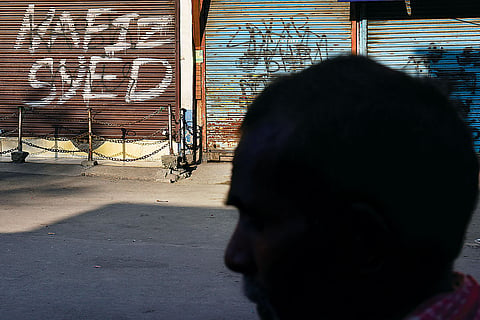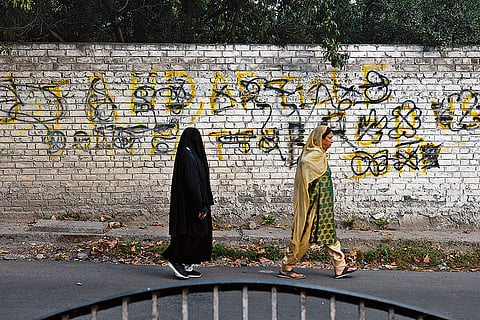This story was published as part of Outlook Magazine's 'Future Tense' issue, dated October 11, 2024. To read more stories from the Issue, click here.
Kashmir's Graffiti From The Past | Photo Story
In Kashmir, people have used walls as a medium to express themselves in the form of graffiti. Most of the graffiti now have been defaced or removed, especially in and around Srinagar. These photographs reflect the juxtaposition between these defaced graffiti messages and the changing political climate.
In the streets of Kashmir, the age-old walls do speak. They speak about time, politics and reflect the region’s political aspirations. People have used walls as a medium to express themselves in the form of graffiti. With collective erasure of memory throughout the years, walls have become the repository of political expressions in Kashmir, particularly in Srinagar. Be it the wide public spaces or the labyrinth of narrow cobbled streets of downtown, it is the walls that speak about the political aspirations and narrates the Kashmir stories through graffiti. Most of the graffiti now have been defaced or removed, especially in and around Srinagar. Today, a few of the remaining defaced messages stand as remnants of a past marked by political defiance.
Since the abrogation of Article 370, which stripped Kashmir of its special status, politics in Kashmir has become uncertain and volatile as well. Silence has overtaken the public expression of political dissent. And, after a decade of political upheaval, in 2024, the Bharatiya Janata Party (BJP) government announced elections in the region, which are witnessing the participation of people.
These photographs reflect the juxtaposition between these defaced graffiti messages and the changing political climate. Are Kashmiris voting because they have grown weary of living in conflict for years? Or is this turnout a form of protest, driven by feelings of betrayal over the loss of their special status? That remains the question. Through these images, I have tried to explore how the graffiti of the past contrasts with the realities of today, offering a reflection on memory, resistance and the complexities of identity in a changing Kashmir.

A motorcyclist rides his bike on the streets of Srinagar

The name, Hafiz Saeed, is written in graffiti style on a shop shutter in the Habba Kadal area of Srinagar

Graffiti Speak: A schoolboy walks past a graffiti in Srinagar.

Women walk past a defaced graffiti that reads ‘UT and Article don’t matter to us’ in Lal Bazar, Srinagar.

People playing volleyball in Harie village, Kupwara district.
Tags